a&e features
‘The Inheritance’ actors reflect on two-part AIDS drama as Broadway production winds down
Great White Way premiere last fall drew mixed reaction but inspired gay players in the cast
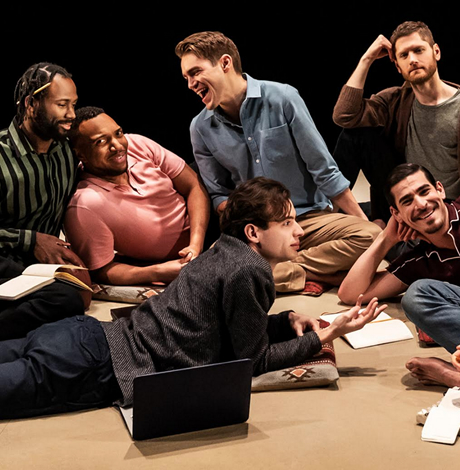
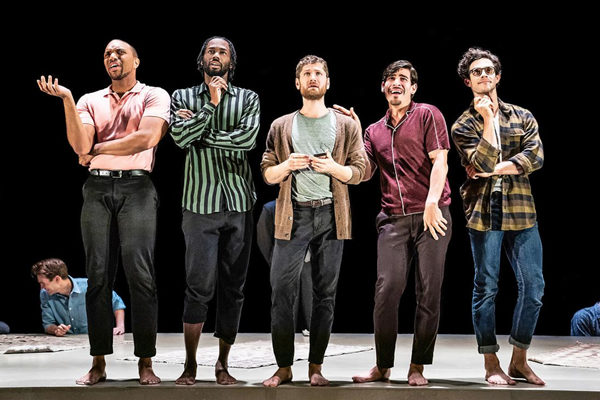
‘The Inheritance’
Wednesdays/Saturdays/Sundays at 1 p.m.
Thursdays/Fridays at 7 p.m.
‘Part 2’
Wednesdays/Saturdays/Sundays at 7 p.m.
Through March 15
Ethel Barrymore Theatre
243 W. 47th St.
New York
A group of four young actors in the cast of “The Inheritance” on Broadway have more in common than a numeric designation noting their membership in the writer’s workshop/internal dialogue that yielded Matthew Lopez’s two-part, nearly seven-hour play.
Set to close on March 15 after 138 post-preview performances (86 of “The Inheritance” and 52 of “The Inheritance Part 2”), this adaptation of E. M. Forster’s “Howards End” sees thematic motifs, plot points and personal fortunes from the 1910 novel play out in a world where PrEP-savvy, politically astute contemporary gay Manhattanites bond, sometimes spar, with counterparts who came of age in Gotham during the HIV/AIDS epidemic’s plague years.
It debuted in London in early 2018 and opened on Broadway last September to largely favorable reviews but a recurring critique has been that unlike its obvious predecessor “Angels in America,” its dramatic heft doesn’t always justify its luxurious length. A New York Times review drew such polarized reader response that the paper had playwright Lopez write a highly unusual piece last month on what inspired the work and why he thought response had been so mixed.
Although there are straight actors playing gay roles in the cast, actors Jordan Barbour, Jonathan Burke, Carson McCalley and Arturo Soria, all identify as either queer or gay and deliver performances that set off ping after ping on the LGBTQ authenticity radar.
As for the four young men on deck at the Ethel Barrymore Theatre, “They’re sort of the blurred line between the characters we’re playing and ourselves,” says Jordan Barbour (Young Man 6), recalling a rehearsal note from playwright Lopez, who explained each of them represents, “a different facet of (lead character) Eric Glass’s brain. They’re the manifestations of the ideas he has while writing the story, which will become the play the audience is watching.”
People can change, the play constantly reminds us, and the sum total of their actions determine whether they’ve faced the final curtain having left a legacy, or squandered their inheritance. To that end, each Young Man maintains a presence throughout the play, occasionally popping up to provide juicy narrative tidbits, or exercise author’s prerogative to revise, setting certain characters down different paths.
Jason and Stephen are two notable beneficiaries of the play’s fondness for sudden pivots. Both mutual friends of Eric, Jason is a first grade teacher in a relationship with Stephen, whose career changes when Young Man 8 declares him to be “a high school science teacher,” cutting off Young Man 2 in mid-sentence, to reboot a timeline that once saw him working as “a human rights —.”
But Young Man 2 does have his say, when a rapid-fire volley with Young Man 8 sees Stephen’s relationship with Jason go from boyfriend, to partner, to husband. What’s more, Stephen’s name is now the same as his husband, giving the couple their own coveted shorthand moniker (“The Jasons”).
Just prior to those alterations, we learn Eric and Tristan met shortly after college. Three dates yielded no romance, but their chemistry proved the perfect formula for a best friend dynamic that remains intact, a seed that takes root when tensions arise down the road.
Barbour, who identifies as gay, says he’s proud to play the role of Tristan, although he does not share his character’s status as a person living with HIV.
That said, notes Barbour, “I wanted that aspect of Tristan to be just that, another part of him, not a defining characteristic. But I do feel like I have a great deal of responsibility on my shoulders, because that is sorely represented in theater, and pop culture in general — not just HIV-positive men, but black gay men.”
As one of many friends who circle their wagons when Eric’s rebound love interest shows the classic signs of a toxic mismatch, straight-shooting Tristan excels at lobbing the kind of quality zingers one expects at a social event where alcohol mixes with the largely gay guest list. But when he engages in debate with the new guy, a billionaire whose support of Trump is unabashedly rooted in the quest for better profit margins, Tristan’s return volley reveals a firm grasp of history and lands, for the most part, on the right side of civility.
The writing does much of the heavy lifting here, but it’s given additional dimension by the actor and director Steven Daltry’s commitment to create a Tristan who reflects the fact that Barbour is the first African American to be cast in the role.
“So as far as that scene goes,” says Barbour, of the sparring session with wealthy conservative Henry Wilcox, “this is a gay black man who is in a room with a Trump voter, whose entire platform has been built on hate, so the challenge was to find how this character is able to unleash his frustration, but also maintain a certain level-headedness. … I often find myself in circles where I can’t lose my cool, because if you unleash your anger, you get labeled as ‘the angry black man.’ And Tristan, he really should have anger at Henry, but he manages to share it in a manner that is not destructive.”
Arturo Luis Soria, who identifies as queer, was also asked to bring his background to the forefront.
“In previous productions,” he says, “I don’t think Jason (2)was Latino.” But Matthew (the playwright) came up to me and said, ‘I want you to put some Spanish in the show.’”
During the rehearsal process, recalls Soria, “I was encouraged to ad lib. Matthew and the director were like, ‘Play, play play!’ All of a sudden, there was a salsa number in the show. I get to dance. I mention flan! It was great to bring my culture, and the language of my family, to the stage.”
And with Jason, adds Soria, “I also get to step into this unapologetically queer force of joy and energy and camp, and I love playing that. When I approached this play, I didn’t want to cut that, or the cultural side, out of me. This was an opportunity to say, ‘Yes, we’re here. Our stories need to be told.’”
Soria says the Broadway production’s commitment to tell those stories has not gone unnoticed.
“A lot of people, a lot of Latinos I’ve spoken to after the show, they’re really happy to see that.”
Count Supreme Court Justice Sonia Maria Sotomayor among those who’ve issued favorable rulings.
“She said some beautiful things to me, about my portrayal of Jason,” Soria says. “That was a huge honor, to hear it from her.”
Others in the cast have similar stories.
Jonathan Burke, who plays Young Man 5, a voice of reason/talent agent, and Charles Wilcox (son of Henry Wilcox) recalls a post-performance conversation with an older person who lived through the plague years.
“There’s a point where we mention names of people who died during the epidemic,” says Burke, “and two of them, back to back, were the names of him and his partner, who died. He said, “I felt his presence with me, like I was with him.’ What more can we ask for, if he feels that love and energy again? And a lot of young people are very moved by it, because they’ve not seen the story of the epidemic played out so honestly and vividly. It’s made them aware of what people before us went through.
Burke, who describes his Young Man 5 as “a baseline of who I am, as a black, gay young man living in the 21st century,” found in Charles (son of Henry) Wilcox “a character so far from myself, who has a completely different perspective from a lot of other characters in the play. He’s not a villain. He just wants what’s best for his family, to make sure their legacy stays strong. I wanted to find the humanity in a character who may seem villainous to some.”
Queer-identified Carson McCalley plays Young Man 3 and, in his portrayal of young Henry Wilcox, brings shades of gray to the character’s highly polarizing contemporary incarnation.
“I was never scared of showing him as flawed,” McCalley says. “The play has an incredible range of queer people, and I don’t think showing someone who (does what he does because he) is scared, is dangerous to the community. In fact, I think it’s an opportunity.”
He relates.
“For a long time, I’ve been really scared. It’s hard being an actor in general, and harder being a queer actor. You’re always thinking about how you’re being viewed. There’s this subconscious bias that the industry has, boxing people in. … But I have never, in my life, been able to connect to anything in a deeper way. So although it’s scary to be a queer actor, the payoff is unimaginable, when you have an opportunity to tell a story that you can own 100 percent, that’s in your blood.”
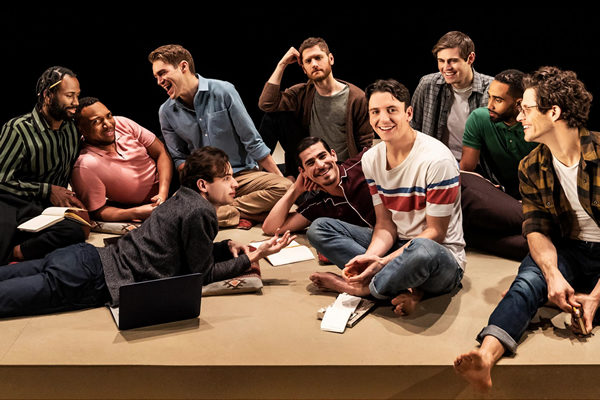
a&e features
Visit Cambridge, a ‘beautiful secret’ on Maryland’s Eastern Shore
New organization promotes town’s welcoming vibe, LGBTQ inclusion

CAMBRIDGE, Md. — Driving through this scenic, historic town on Maryland’s Eastern Shore, you’ll be charmed by streets lined with unique shops, restaurants, and beautifully restored Victorian homes. You’ll also be struck by the number of LGBTQ Pride flags flying throughout the town.
The flags are a reassuring signal that everyone is welcome here, despite the town’s location in ruby red Dorchester County, which voted for Donald Trump over Kamala Harris by a lopsided margin. But don’t let that deter you from visiting. A new organization, Proudly Cambridge, is holding its debut Pride event this weekend, touting the town’s welcoming, inclusive culture.
“We stumbled on a beautiful secret and we wanted to help get the word out,” said James Lumalcuri of the effort to create Proudly Cambridge.
The organization celebrates diversity, enhances public spaces, and seeks to uplift all that Cambridge has to share, according to its mission statement, under the tagline “You Belong Here.”
The group has so far held informal movie nights and a picnic and garden party; the launch party is June 28 at the Cambridge Yacht Club, which will feature a Pride celebration and tea dance. The event’s 75 tickets sold out quickly and proceeds benefit DoCo Pride.
“Tickets went faster than we imagined and we’re bummed we can’t welcome everyone who wanted to come,” Lumalcuri said, adding that organizers plan to make “Cheers on the Choptank” an annual event with added capacity next year.
One of the group’s first projects was to distribute free Pride flags to anyone who requested one and the result is a visually striking display of a large number of flags flying all over town. Up next: Proudly Cambridge plans to roll out a program offering affirming businesses rainbow crab stickers to show their inclusiveness and LGBTQ support. The group also wants to engage with potential visitors and homebuyers.
“We want to spread the word outside of Cambridge — in D.C. and Baltimore — who don’t know about Cambridge,” Lumalcuri said. “We want them to come and know we are a safe haven. You can exist here and feel comfortable and supported by neighbors in a way that we didn’t anticipate when we moved here.”

Lumalcuri, 53, a federal government employee, and his husband, Lou Cardenas, 62, a Realtor, purchased a Victorian house in Cambridge in 2021 and embarked on an extensive renovation. The couple also owns a home in Adams Morgan in D.C.
“We saw the opportunity here and wanted to share it with others,” Cardenas said. “There’s lots of housing inventory in the $300-400,000 range … we’re not here to gentrify people out of town because a lot of these homes are just empty and need to be fixed up and we’re happy to be a part of that.”
Lumalcuri was talking with friends one Sunday last year at the gazebo (affectionately known as the “gayzebo” by locals) at the Yacht Club and the idea for Proudly Cambridge was born. The founding board members are Lumalcuri, Corey van Vlymen, Brian Orjuela, Lauren Mross, and Caleb Holland. The group is currently working toward forming a 501(c)3.
“We need visibility and support for those who need it,” Mross said. “We started making lists of what we wanted to do and the five of us ran with it. We started meeting weekly and solidified what we wanted to do.”
Mross, 50, a brand strategist and web designer, moved to Cambridge from Atlanta with her wife three years ago. They knew they wanted to be near the water and farther north and began researching their options when they discovered Cambridge.
“I had not heard of Cambridge but the location seemed perfect,” she said. “I pointed on a map and said this is where we’re going to move.”
The couple packed up, bought a camper trailer and parked it in different campsites but kept coming back to Cambridge.
“I didn’t know how right it was until we moved here,” she said. “It’s the most welcoming place … there’s an energy vortex here – how did so many cool, progressive people end up in one place?”
Corey van Vlymen and his husband live in D.C. and were looking for a second home. They considered Lost River, W.Va., but decided they preferred to be on the water.
“We looked at a map on both sides of the bay and came to Cambridge on a Saturday and bought a house that day,” said van Vlymen, 39, a senior scientist at Booz Allen Hamilton. They’ve owned in Cambridge for two years.
They were drawn to Cambridge due to its location on the water, the affordable housing inventory, and its proximity to D.C.; it’s about an hour and 20 minutes away.
Now, through the work of Proudly Cambridge, they hope to highlight the town’s many attributes to residents and visitors alike.
“Something we all agree on is there’s a perception problem for Cambridge and a lack of awareness,” van Vlymen said. “If you tell someone you’re going to Cambridge, chances are they think, ‘England or Massachusetts?’”
He cited the affordability and the opportunity to save older, historic homes as a big draw for buyers.
“It’s all about celebrating all the things that make Cambridge great,” Mross added. “Our monthly social events are joyful and celebratory.” A recent game night drew about 70 people.
She noted that the goal is not to gentrify the town and push longtime residents out, but to uplift all the people who are already there while welcoming new visitors and future residents.
They also noted that Proudly Cambridge does not seek to supplant existing Pride-focused organizations. Dorchester County Pride organizes countywide Pride events and Delmarva Pride was held in nearby Easton two weeks ago.
“We celebrate all diversity but are gay powered and gay led,” Mross noted.
To learn more about Proudly Cambridge, visit the group on Facebook and Instagram.
What to see and do
Cambridge, located 13 miles up the Choptank River from the Chesapeake Bay, has a population of roughly 15,000. It was settled in 1684 and named for the English university town in 1686. It is home to the Harriet Tubman Museum, mural, and monument. Its proximity to the Blackwater National Wildlife Refuge makes it a popular stop for birders, drawn to more than 27,000 acres of marshland dubbed “the Everglades of the north.”
The refuge is walkable, bikeable, and driveable, making it an accessible attraction for all. There are kayaking and biking tours through Blackwater Adventures (blackwateradventuresmd.com).
Back in town, take a stroll along the water and through historic downtown and admire the architecture. Take in the striking Harriet Tubman mural (424 Race St.). Shop in the many local boutiques, and don’t miss the gay-owned Shorelife Home and Gifts (421 Race St.), filled with stylish coastal décor items.
Stop for breakfast or lunch at Black Water Bakery (429 Race St.), which offers a full compliment of coffee drinks along with a build-your-own mimosa bar and a full menu of creative cocktails.
The Cambridge Yacht Club (1 Mill St.) is always bustling but you need to be a member to get in. Snapper’s on the water is temporarily closed for renovations. RaR Brewing (rarbrewing.com) is popular for craft beers served in an 80-year-old former pool hall and bowling alley. The menu offers burgers, wings, and other bar fare.
For dinner or wine, don’t miss the fantastic Vintage 414 (414 Race St.), which offers lunch, dinner, wine tasting events, specialty foods, and a large selection of wines. The homemade cheddar crackers, inventive flatbreads, and creative desserts (citrus olive oil cake, carrot cake trifle) were a hit on a recent visit.
Also nearby is Ava’s (305 High St.), a regional chain offering outstanding Italian dishes, pizzas, and more.
For something off the beaten path, visit Emily’s Produce (22143 Church Creek Rd.) for its nursery, produce, and prepared meals.
“Ten minutes into the sticks there’s a place called Emily’s Produce, where you can pay $5 and walk through a field and pick sunflowers, blueberries, you can feed the goats … and they have great food,” van Vlymen said.
As for accommodations, there’s the Hyatt Regency Chesapeake Bay (100 Heron Blvd. at Route 50), a resort complex with golf course, spa, and marina. Otherwise, check out Airbnb and VRBO for short-term rentals closer to downtown.
Its proximity to D.C. and Baltimore makes Cambridge an ideal weekend getaway. The large LGBTQ population is welcoming and they are happy to talk up their town and show you around.
“There’s a closeness among the neighbors that I wasn’t feeling in D.C.,” Lumalcuri said. “We look after each other.”
a&e features
James Baldwin bio shows how much of his life is revealed in his work
‘A Love Story’ is first major book on acclaimed author’s life in 30 years

‘Baldwin: A Love Story’
By Nicholas Boggs
c.2025, FSG
$35/704 pages
“Baldwin: A Love Story” is a sympathetic biography, the first major one in 30 years, of acclaimed Black gay writer James Baldwin. Drawing on Baldwin’s fiction, essays, and letters, Nicolas Boggs, a white writer who rediscovered and co-edited a new edition of a long-lost Baldwin book, explores Baldwin’s life and work through focusing on his lovers, mentors, and inspirations.
The book begins with a quick look at Baldwin’s childhood in Harlem, and his difficult relationship with his religious, angry stepfather. Baldwin’s experience with Orilla Miller, a white teacher who encouraged the boy’s writing and took him to plays and movies, even against his father’s wishes, helped shape his life and tempered his feelings toward white people. When Baldwin later joined a church and became a child preacher, though, he felt conflicted between academic success and religious demands, even denouncing Miller at one point. In a fascinating late essay, Baldwin also described his teenage sexual relationship with a mobster, who showed him off in public.
Baldwin’s romantic life was complicated, as he preferred men who were not outwardly gay. Indeed, many would marry women and have children while also involved with Baldwin. Still, they would often remain friends and enabled Baldwin’s work. Lucien Happersberger, who met Baldwin while both were living in Paris, sent him to a Swiss village, where he wrote his first novel, “Go Tell It on the Mountain,” as well as an essay, “Stranger in the Village,” about the oddness of being the first Black person many villagers had ever seen. Baldwin met Turkish actor Engin Cezzar in New York at the Actors’ Studio; Baldwin later spent time in Istanbul with Cezzar and his wife, finishing “Another Country” and directing a controversial play about Turkish prisoners that depicted sexuality and gender.
Baldwin collaborated with French artist Yoran Cazac on a children’s book, which later vanished. Boggs writes of his excitement about coming across this book while a student at Yale and how he later interviewed Cazac and his wife while also republishing the book. Baldwin also had many tumultuous sexual relationships with young men whom he tried to mentor and shape, most of which led to drama and despair.
The book carefully examines Baldwin’s development as a writer. “Go Tell It on the Mountain” draws heavily on his early life, giving subtle signs of the main character John’s sexuality, while “Giovanni’s Room” bravely and openly shows a homosexual relationship, highly controversial at the time. “If Beale Street Could Talk” features a woman as its main character and narrator, the first time Baldwin wrote fully through a woman’s perspective. His essays feel deeply personal, even if they do not reveal everything; Lucian is the unnamed visiting friend in one who the police briefly detained along with Baldwin. He found New York too distracting to write, spending his time there with friends and family or on business. He was close friends with modernist painter Beauford Delaney, also gay, who helped Baldwin see that a Black man could thrive as an artist. Delaney would later move to France, staying near Baldwin’s home.
An epilogue has Boggs writing about encountering Baldwin’s work as one of the few white students in a majority-Black school. It helpfully reminds us that Baldwin connects to all who feel different, no matter their race, sexuality, gender, or class. A well-written, easy-flowing biography, with many excerpts from Baldwin’s writing, it shows how much of his life is revealed in his work. Let’s hope it encourages reading the work, either again or for the first time.
a&e features
Looking back at 50 years of Pride in D.C
Washington Blade’s unique archives chronicle highs, lows of our movement
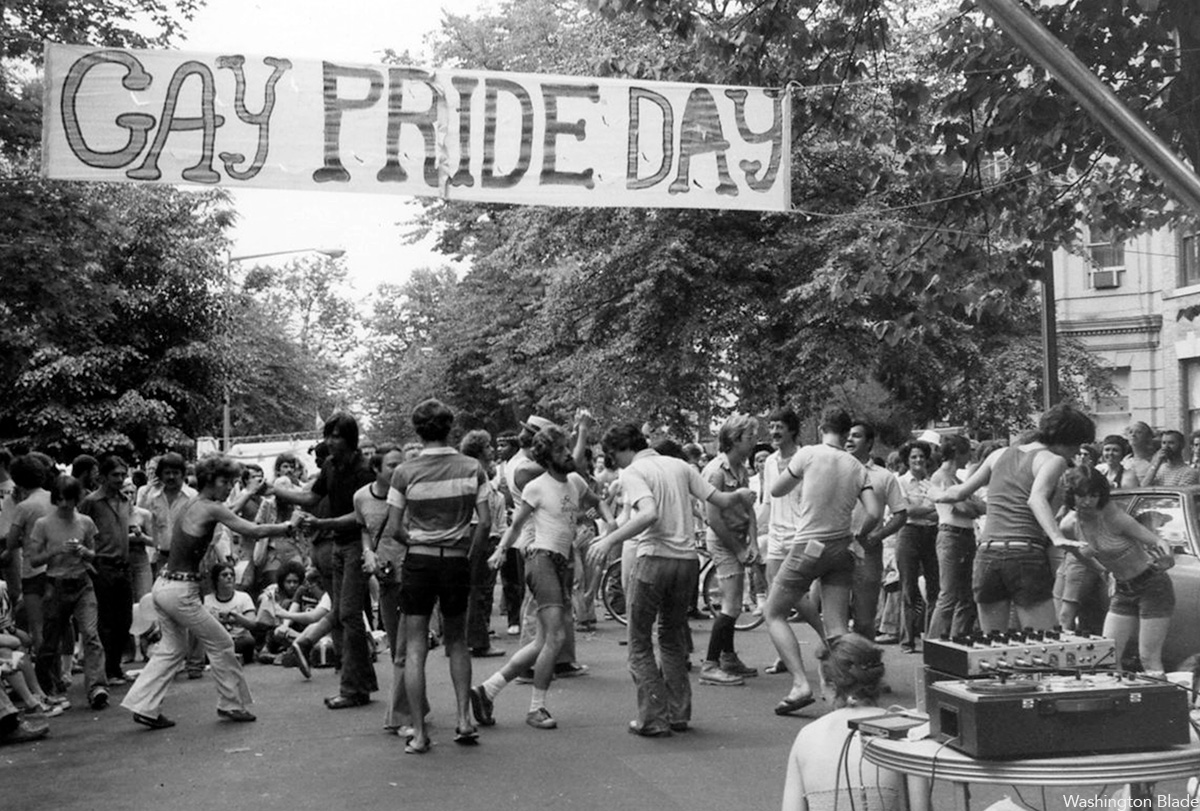
To celebrate the 50th anniversary of LGBTQ Pride in Washington, D.C., the Washington Blade team combed our archives and put together a glossy magazine showcasing five decades of celebrations in the city. Below is a sampling of images from the magazine but be sure to find a print copy starting this week.
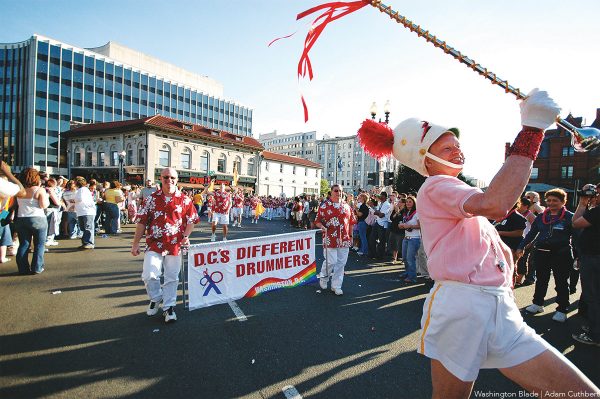
The magazine is being distributed now and is complimentary. You can find copies at LGBTQ bars and restaurants across the city. Or visit the Blade booth at the Pride festival on June 7 and 8 where we will distribute copies.
Thank you to our advertisers and sponsors, whose support has enabled us to distribute the magazine free of charge. And thanks to our dedicated team at the Blade, especially Photo Editor Michael Key, who spent many hours searching the archives for the best images, many of which are unique to the Blade and cannot be found elsewhere. And thanks to our dynamic production team of Meaghan Juba, who designed the magazine, and Phil Rockstroh who managed the process. Stephen Rutgers and Brian Pitts handled sales and marketing and staff writers Lou Chibbaro Jr., Christopher Kane, Michael K. Lavers, Joe Reberkenny along with freelancer and former Blade staffer Joey DiGuglielmo wrote the essays.

The magazine represents more than 50 years of hard work by countless reporters, editors, advertising sales reps, photographers, and other media professionals who have brought you the Washington Blade since 1969.
We hope you enjoy the magazine and keep it as a reminder of all the many ups and downs our local LGBTQ community has experienced over the past 50 years.
I hope you will consider supporting our vital mission by becoming a Blade member today. At a time when reliable, accurate LGBTQ news is more essential than ever, your contribution helps make it possible. With a monthly gift starting at just $7, you’ll ensure that the Blade remains a trusted, free resource for the community — now and for years to come. Click here to help fund LGBTQ journalism.
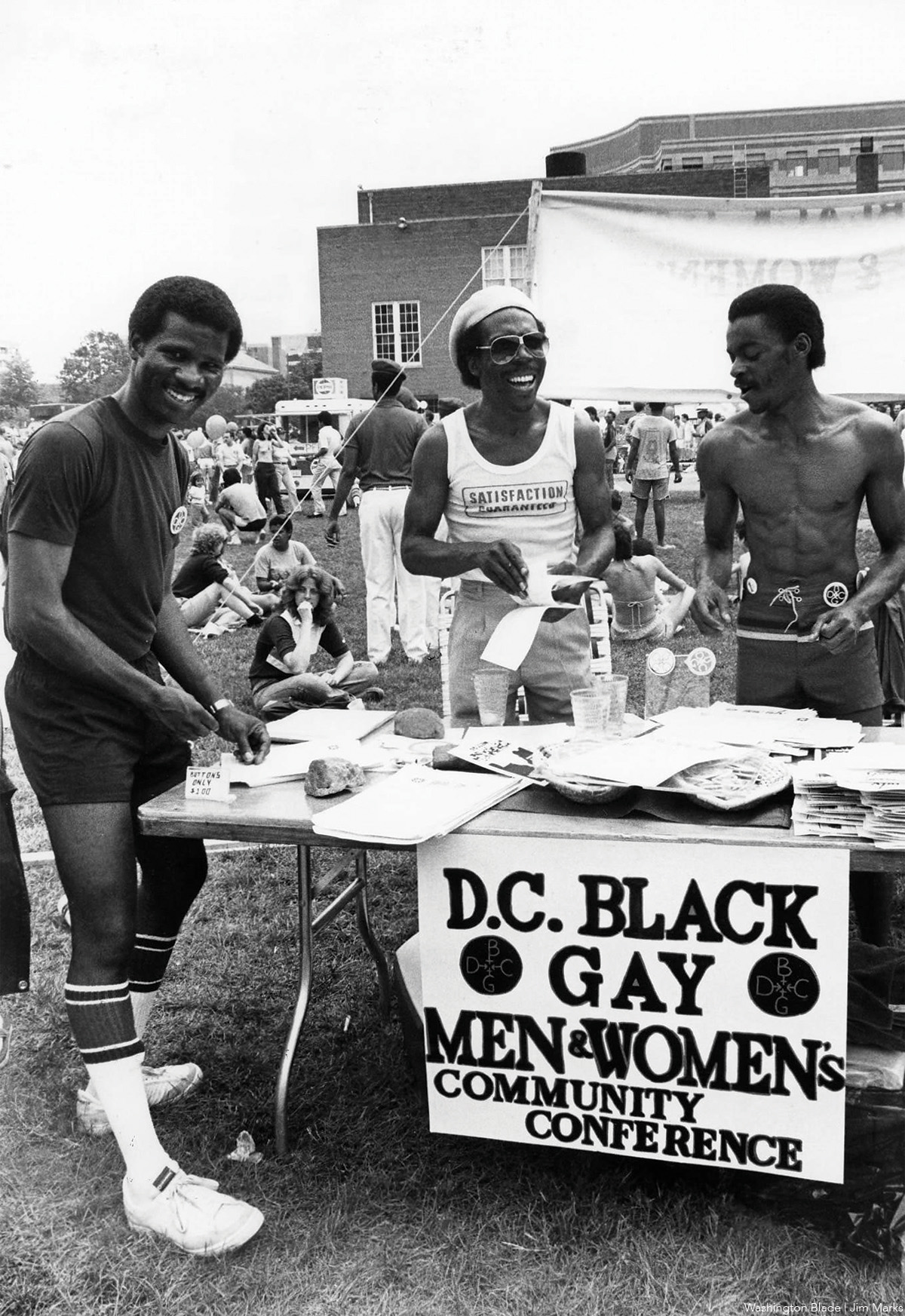
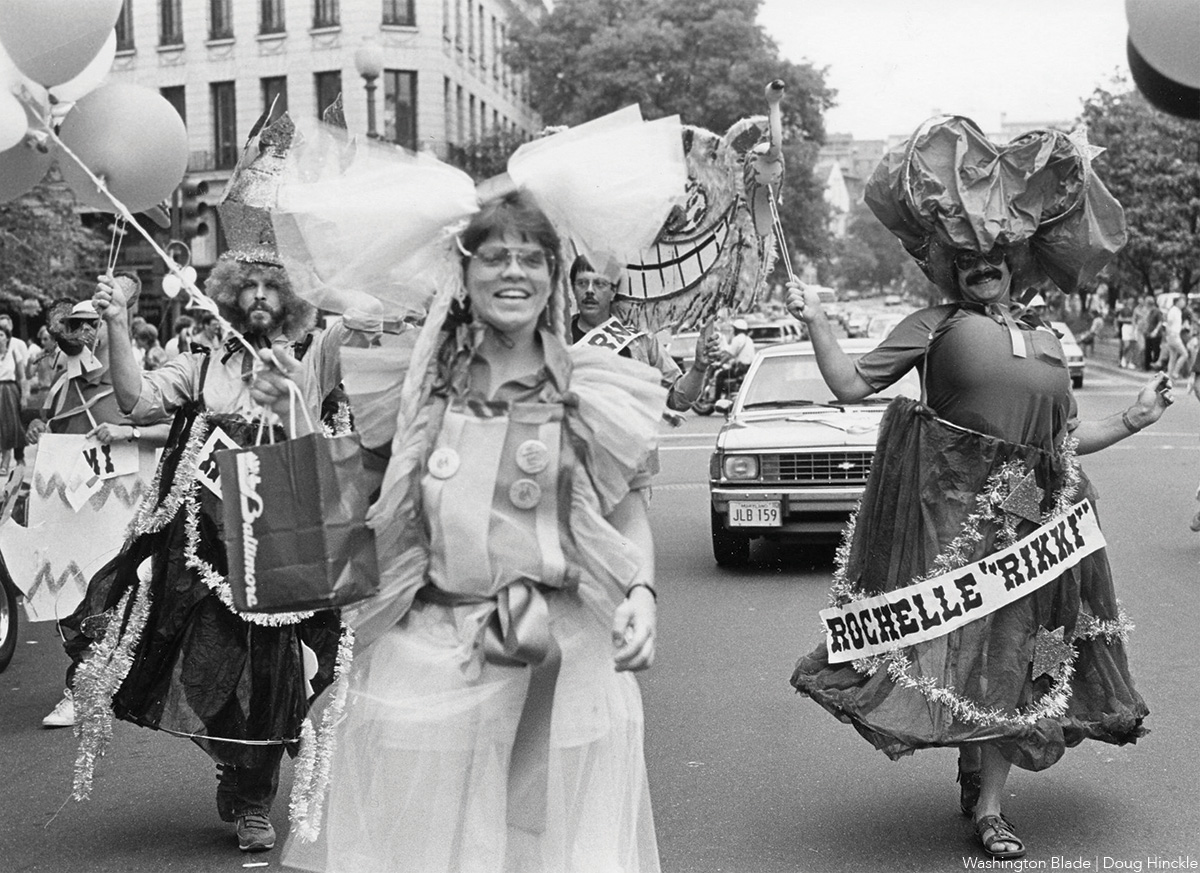

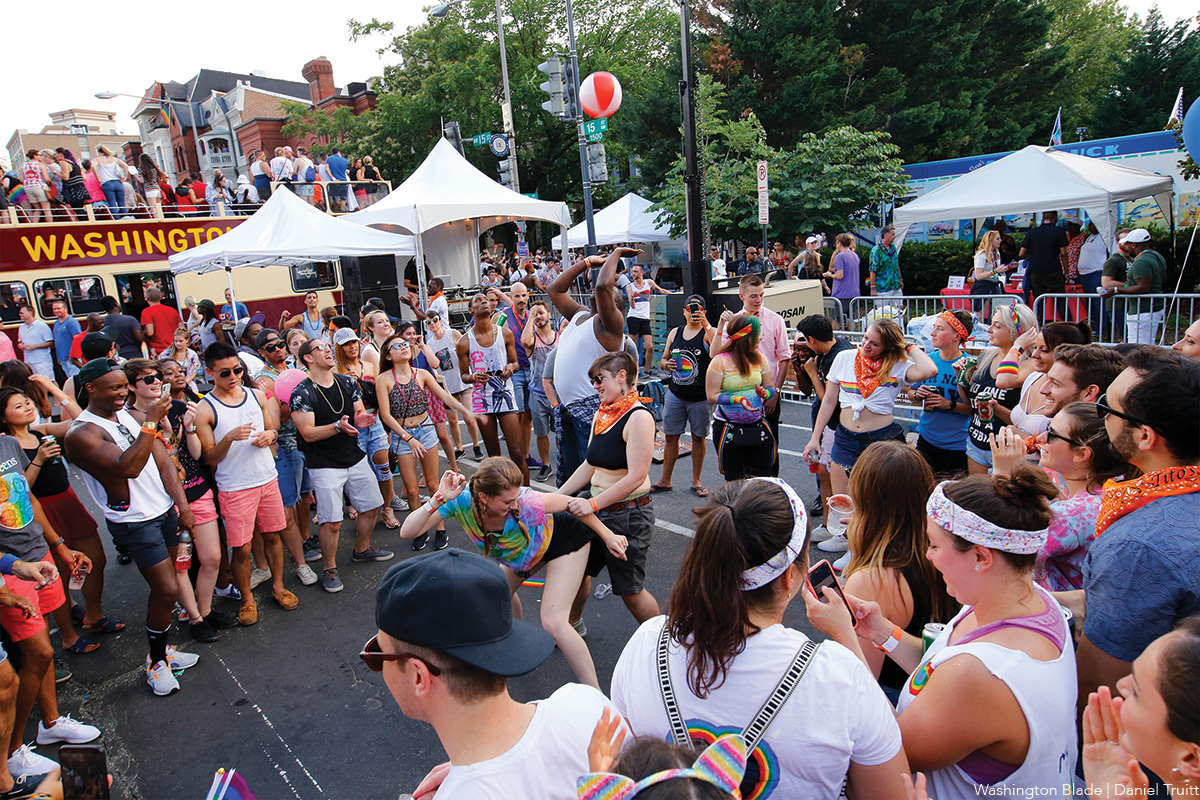
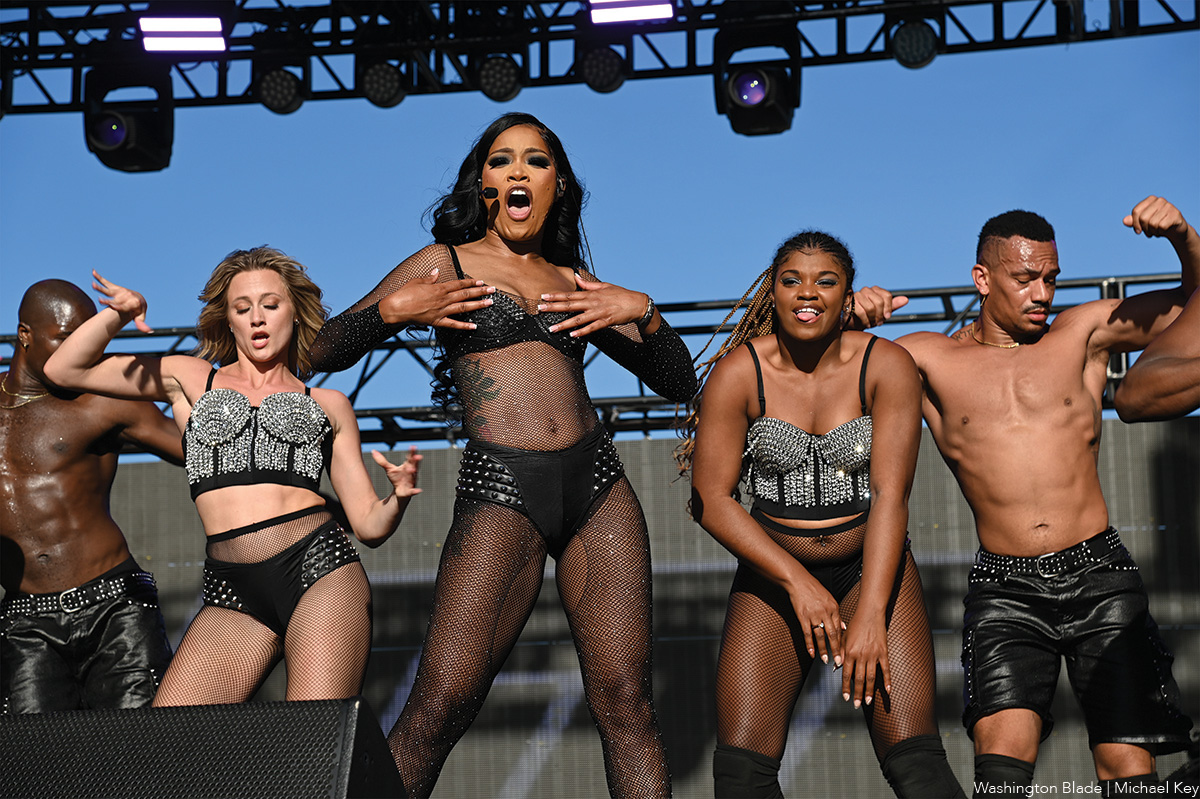
-

 U.S. Supreme Court4 days ago
U.S. Supreme Court4 days agoSupreme Court upholds ACA rule that makes PrEP, other preventative care free
-

 U.S. Supreme Court4 days ago
U.S. Supreme Court4 days agoSupreme Court rules parents must have option to opt children out of LGBTQ-specific lessons
-

 Congress5 days ago
Congress5 days agoSenate parliamentarian orders removal of gender-affirming care ban from GOP reconciliation bill
-

 District of Columbia5 days ago
District of Columbia5 days agoMan sentenced to 15 years in prison for drug deal that killed two DC gay men










